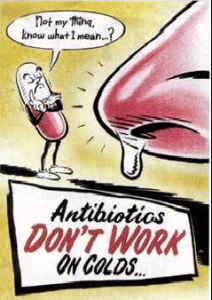 Many of us are eternally grateful for the discovery by Sir Alexander Fleming that he discovered the antibiotic substance penicillin from the fungus Penicillium notatum in 1928, for which he shared the Nobel Prize in Physiology or Medicine in 1945 with colleagues Howard Walter Florey and Ernst Boris Chain.
Many of us are eternally grateful for the discovery by Sir Alexander Fleming that he discovered the antibiotic substance penicillin from the fungus Penicillium notatum in 1928, for which he shared the Nobel Prize in Physiology or Medicine in 1945 with colleagues Howard Walter Florey and Ernst Boris Chain.
But like many drugs they have been overused and over prescribed, antibiotics kill bacteria only and the use of these for viral infections, as well as prolonged use and antibacterial resistance have been discussed in many newspapers and journals. Michael Ash BSc.DO.ND.DipION has written an informative review exploring the science behind a single dose or single course of antibiotics and the detrimental effects on the microbiota – the bacterial colonies that share our gastrointestinal tract.
It seems that a number of key components are damaged by antibiotics and practitioners may be well advised to be more consistent in their application of suitable prevention strategies to keep this damage to a minimum, especially in the vulnerable patient. Antibiotic treatment alters the delicate bacterial balance by causing compositional changes in the intestinal microbiota, and may lead to a homeostatic imbalance through alterations in expression of the gastrointestinal cell lining’s tight junction proteins, mucins, antimicrobial peptides, and cytokines.
